
| We awoke to find that our arrival was about 30 minutes earlier than expected. Piers and breakwaters always provide interesting lines for picture taking. | 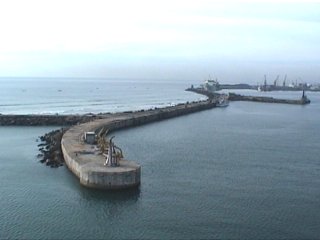 |
| Here's how the Chennai, India pier looked. | 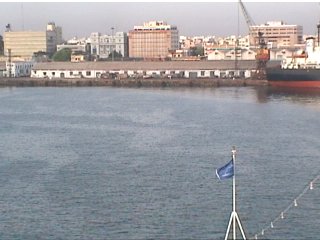 |
| A small band on the pier provided a welcome for the early risers. | 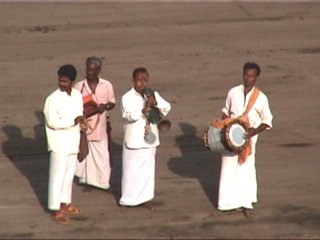 |
| Every once in a while, some enterprising firms at a port will furnish cell phones and even a cybercafe right on board! In Chennai, we see Julie Kiefer using a cell-phone to call her parents, with the five computers in the makeshift cybercafe in the background. Her college project mascot, "Simon" sits behind the printer waiting patiently. | 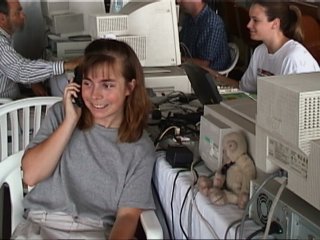 |
| While I was taking a group (a grand total of four people) on a tour of the port facilities, Carole, Christy, and Lauren visited Mother Theresa's Missionaries of Charity orphanage. Here is a photo of Carole comforting an infant (photo taken by Deborah Byrnes). Note: Yes, I know, this was yet another orphanage that I missed! | 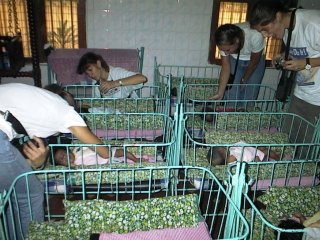 |
| At a Welcome Reception, we met several faculty and students. One student, Aravind Ramanujam, is finishing his degree in E-Commerce. | 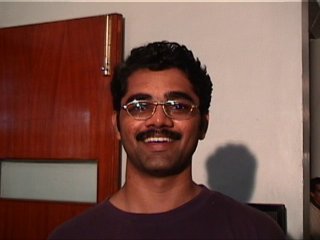 |
| These professors invited me to their school to give a talk on E-Commerce on October 29. I thoroughly enjoyed interacting with these fine people, and their friendship, hospitality, and the tasty onion paratha lunch all proved that I received the greater benefit. Note: this is a self-portrait! Also note the red dot (called a "kum-kum") on my forehead; you'll see them on everyone in these shots. | 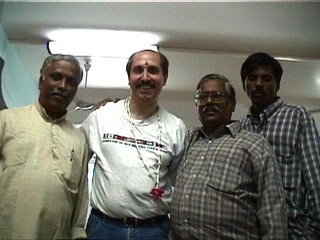 |
| Also at the Welcome Reception, A dancer captivated us with her combination of dance and storytelling. | 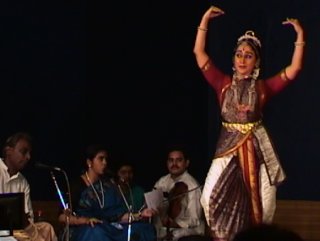 |
| The dancer posed with students and family members afterwards. | 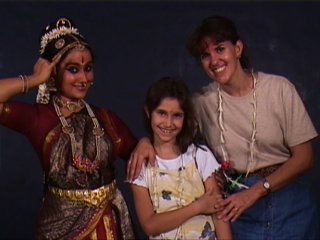 |
| Topping off the reception were demonstrations of Henna art. Henna paste dries on the skin and falls off after a few hours, leaving behind a brown stain that lasts 6 weeks. Here's Christy showing off hers. | 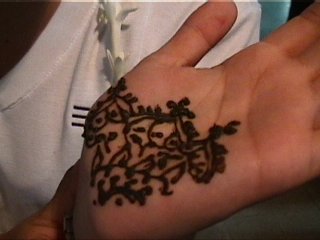 |
| Of course, Lauren stepped right up so she would not be left behind. | 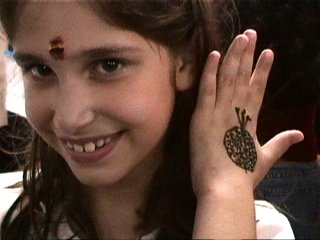 |
| Traffic was pretty horrendous in Chennai. In fact, traffic was so bad that there was a hotel with a curious name (photographed from a vehicle that was in a traffic jam)! | 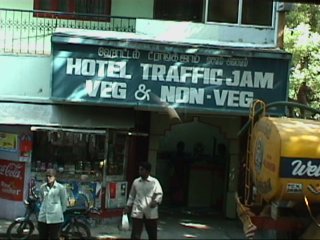 |
| Traffic included bicycles, motorcycles, cars, buses, and everything else you might dream up. One that you would probably not dream up would be an "autorickshaw," which was like a motorcycle with a metal structure attached to seat three relatively comfortably. Another that you wouldn't think of was a cart (like this one) pulled by an ox at night. Did it have headlights? I'll never know! | 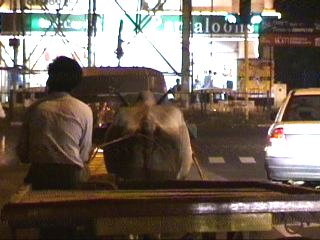 |
| To handle the multiplicity of vehicles, it is profoundly important to beep your horn at every possible opportunity. Many vehicles (like this truck) have a sign on their back requesting this service. Beeping enables a vehicle in front of you to swerve quickly to the side, enabling you to pass and enabling a smaller vehicle's driver to see the light of yet another day. | 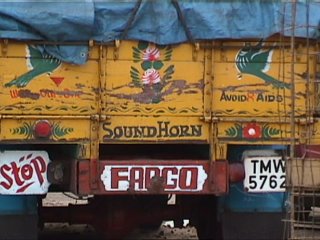 |
| Fourteen of us visited the newest office of Tata Consulting Services, the largest software developing firm in India. Lots of U.S. companies use their programming, which the exchange rate makes very, very reasonable. Programmers who earn about $1.50 per hour in such firms end up with annual income of about $3,000, which is 10 times the national average. This is a side of their state-of-the-art building, showing the stark contrast between the new and the old nearby. | 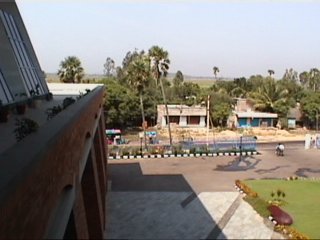 |
| We had a great experience during the last three days--a stay with a kind, generous Rotarian family. We'll never forget Annamalai (extreme left), Azhagu (extreme right), and their kids Arvind (11) and Arjun (5). Their expert driver got us around safely, and their expert cook kept us filled with delectable sauces. Arvind gave us a great tutorial on what we were eating at the first day's lunch, while Azhagu took over on her return from a business trip. Azhagu took Carole, Christy, and Lauren shopping on the last day while I took the group to Tata Consulting. | 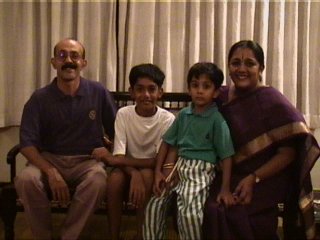 |
| The Annamalai's car (actually a sport utility vehicle) was made by Tata, a large conglomerate that owns the consulting firm we visited. Again because of the exchange rate, it would be an understatement to say that American goods are extremely expensive. India has rich natural resources and can produce the lion's share of their needs with their own products. Tata produces steel, textiles, chemicals, and even this "Sumo" automobile, a name that our good neighbors and friends the Jacksons will appreciate. Do you think they named their yellow lab after this car or vice-versa? | 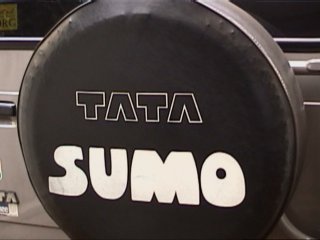 |
| At a Rotary meeting, Carole presented a banner of the Hampton Rotary chapter to one of the Chennai chapters (Adyar) and received one of theirs in return. | 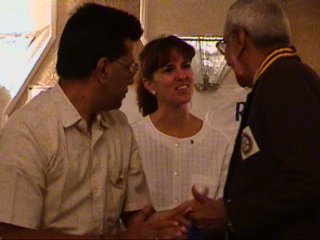 |
| They asked her to say a few words, and she did a great job at the microphone. She wants the local Rotary club to know that she'll return to Pittsburgh with her makeup (attendance) card. There was lots of talk about a possible joint project between clubs. | 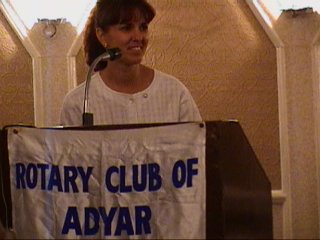 |
| The Rotary group took us on a tour that included several stops. One stop included the very interesting Mamallapuram temple, and Christy poses in front of the ancient structure. | 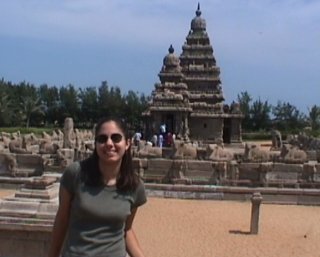 |
| Another stop included large rock carvings. Christy poses in front of one of the interesting carvings. | 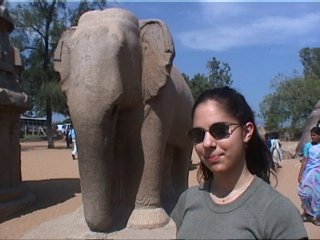 |
| One item Christy could not stand near was this guy. We visited a crocodile farm that was crawling with 'em! This one was moving nearby, watching the human visitors while crawling along. | 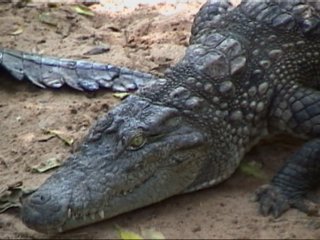 |
| Not only were there crocodiles at the farm, but also cobra snakes. We watched in disbelief as the workers handled the snakes as they hissed, lunged, and spit at the them. The workers were extracting venom for medical research. These two pivoted in unison like satellite dishes, always facing the workers as they moved about. | 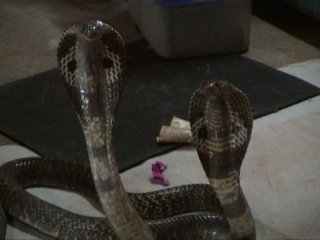 |
| Another unexpected species at the crocodile farm were beautiful red and black butterflies. This one's for you, Jessica! | 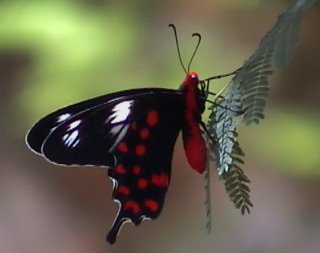 |
| Children frequented the crocodile farm, and they enjoyed posing. | 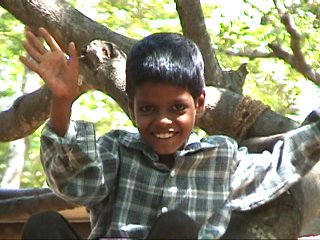 |
| You might have heard of India's now-illegal caste system, with the lowest class previously called the "untouchables" (now called Dalits). There is a Dalit Liberation Education Trust dedicated to breaking down the barriers that still exist, and that foundation organized our farewell reception. Here is Carole posing with two of the Dalit students who danced and sang on stage. I was moved by the impressive talent, happiness, and joy on stage that night. | 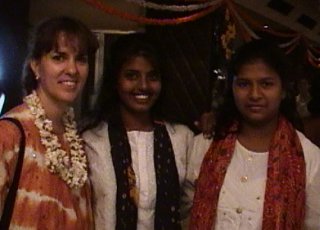 |